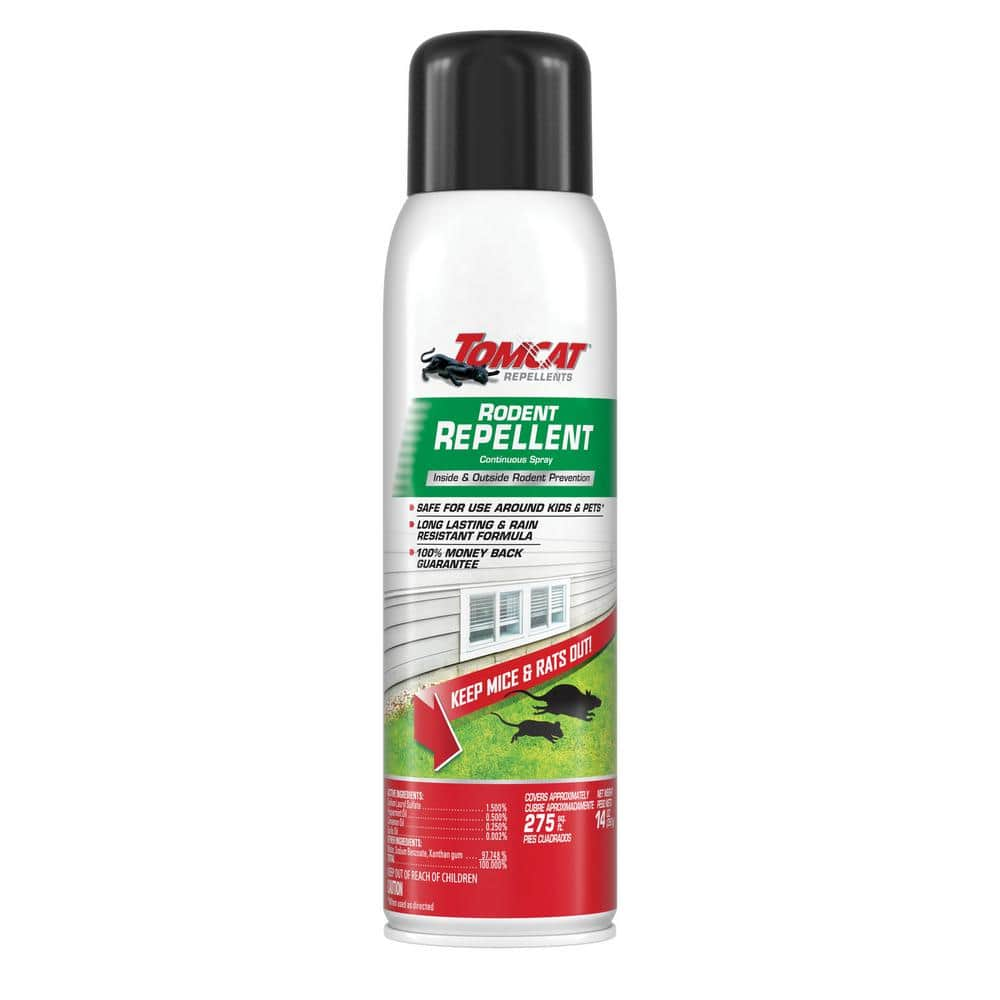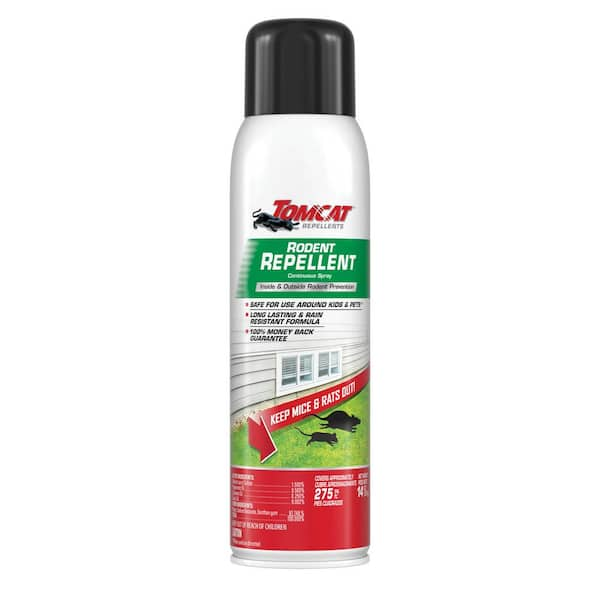Mice Rodent Repellent For Rats Mouse Deterrent: Effective Solutions
Are you tired of finding droppings, chewed wires, or tiny footprints around your home? Rats and mice can cause more trouble than you think, from damaging your belongings to spreading germs.
But what if you could keep these unwanted guests away without harsh chemicals or traps? A good mice rodent repellent might be the simple solution you need. You’ll discover effective ways to deter rats and mice, protect your space, and finally get peace of mind.
Keep reading to learn how to take control of your home and say goodbye to pesky rodents for good.
Types Of Rodent Repellents
Rodent repellents help keep rats and mice away from homes and gardens. These products come in different types. Each type works in a unique way to deter rodents. Understanding the options makes it easier to choose the right repellent.
Natural Repellents
Natural repellents use smells that rats and mice dislike. Common examples include peppermint oil, garlic, and vinegar. These scents confuse rodents and make areas less attractive. Natural repellents are safe for pets and children. They need regular reapplication for best results.
Chemical Repellents
Chemical repellents contain substances that irritate rodents. These products often come as sprays or granules. They create an unpleasant environment for rats and mice. Chemical repellents usually work faster than natural ones. Use them carefully and follow the instructions strictly.
Electronic Devices
Electronic rodent repellents emit high-frequency sounds. These sounds bother rodents but are silent to humans. They cover a specific area, like a room or garage. Electronic devices are easy to use and reusable. They require power from batteries or outlets.
How Repellents Work
Rodent repellents help keep rats and mice away without harming them. They use different methods to make the area uncomfortable or unpleasant for these pests. Understanding how repellents work can help you choose the best option for your home or garden.
Scent-based Deterrents
Rodents rely heavily on their sense of smell. Scent-based repellents use strong odors that rats and mice dislike. Common scents include peppermint, ammonia, and predator urine. These smells confuse rodents and make them avoid treated areas. Scent repellents are safe for humans and pets when used properly.
Ultrasonic Waves
Ultrasonic repellents emit high-frequency sounds. These sounds are too high for humans to hear but disturb rodents. The noise creates an uncomfortable environment for rats and mice. Over time, they move away to quieter places. Ultrasonic devices need power to work and coverage depends on the room size.
Taste Aversion
Taste aversion repellents affect rodents after they try to eat treated food. The repellents create a bad taste or mild discomfort. This experience teaches rodents to avoid the area and food. Taste deterrents work best when combined with other repellent methods for stronger effect.
Choosing The Right Repellent
Choosing the right mice rodent repellent matters for effective control. Different repellents suit different places and rodent types. This guide helps pick the best option for your needs. It covers use inside and outside, safety tips, and which rodents each repellent works on.
Indoor Vs Outdoor Use
Repellents for indoor use must be safe for people and pets. They often come as sprays or ultrasonic devices. Outdoor repellents face rain and wind. They need to be weatherproof and cover larger areas. Some products work well both inside and outside. Check the label to see where each repellent is best used.
Safety Considerations
Choose repellents that do not harm humans or pets. Avoid toxic chemicals around children and animals. Natural ingredients like peppermint oil are safer choices. Follow instructions to prevent accidents. Proper placement reduces risk and improves results. Safety keeps your home healthy and rodent-free.
Effectiveness Against Different Rodents
Not all repellents work on every rodent. Some repel mice but not rats, and vice versa. Identify the pest before buying. Some repellents use sound frequencies that target specific rodents. Others use smells that rodents dislike. Matching repellent to pest type increases success.

Credit: www.homedepot.com
Diy Rodent Repellent Solutions
DIY rodent repellent solutions offer simple and natural ways to keep rats and mice away. These methods are safe for homes and pets. They also save money compared to store-bought products. Using everyday items, you can create effective barriers and sprays. These solutions work by making your space less attractive to rodents. Let’s explore some easy DIY options that anyone can try.
Herbs And Essential Oils
Many herbs and oils smell strong and repel rodents. Peppermint oil is one of the best. Mice dislike its sharp scent. Other helpful herbs include lavender, rosemary, and eucalyptus. Place fresh herbs or cotton balls soaked in oils around your home. Focus on areas where rodents enter or hide. Replace them every few days to keep the smell strong. These natural scents confuse rodents and keep them away.
Homemade Spray Recipes
Creating a homemade spray is a simple way to deter mice and rats. Mix water with peppermint oil and a few drops of dish soap. The soap helps the oil stick to surfaces. Spray this mixture around doorways, windows, and baseboards. Avoid spraying on food or pets. The strong smell will discourage rodents from entering. Reapply the spray every few days or after cleaning.
Physical Barriers
Physical barriers block rodents from entering your home. Seal cracks and holes with steel wool or caulk. Rats and mice cannot chew through these materials. Cover vents and openings with metal mesh. Use door sweeps to close gaps under doors. Keep food in sealed containers to reduce attraction. These barriers stop rodents from finding easy access indoors.
Tips For Maximizing Repellent Effectiveness
Using a mice rodent repellent works best with simple, clear steps. These tips help keep rats and mice away for longer. Follow these easy methods to get the best results from your repellent.
Proper Placement
Place the repellent where rodents travel most. Check near walls, corners, and entry points. Avoid spots that get wet or very hot. Keep the repellent low to the ground. This helps the smell reach the rodents quickly.
Regular Maintenance
Replace or refresh the repellent regularly. The scent fades over time and loses power. Clean the area to remove food and nesting materials. Keep the space tidy to stop rodents from returning. Check the repellent often for the best results.
Combining Methods
Use repellent with traps or sealing holes. Rodents avoid smells but also look for food and shelter. Blocking entry points stops them from getting inside. Traps help catch rodents that ignore the repellent. This mix of methods improves your chances of success.

Credit: www.amazon.com
Common Mistakes To Avoid
Using a mice rodent repellent for rats and mice can be effective. Avoid mistakes that reduce its power. Many people make simple errors that let rodents return. Learn what to avoid for better results.
Ignoring Rodent Entry Points
Rodents enter through small holes and cracks. Blocking these entry points is key. Without sealing them, repellents only work partly. Check walls, doors, and windows carefully. Seal all gaps to stop rodents from coming in.
Overreliance On One Method
Relying on only one repellent method limits success. Rodents can get used to a single approach. Use multiple methods together for best results. Combine traps, repellents, and cleanliness to keep rodents away.
Using Harmful Chemicals
Some chemicals harm pets and children. Choose safe, non-toxic repellents instead. Harsh chemicals can cause health problems. Natural or ultrasonic repellents offer safer options. Protect your family while deterring rodents.
When To Call Professional Pest Control
Knowing when to call professional pest control is key to handling a rodent problem. Small issues can grow fast. Early action stops damage and health risks.
Some situations need expert help beyond home repellents. Professionals have tools and skills to remove rats and mice safely and fully.
Signs Of Severe Infestation
Look for droppings in many places. Hearing scratching or scurrying inside walls or ceilings. Finding chewed wires or furniture. Smelling strong, musty odors. Seeing nests made of shredded material. These signs show rats or mice are living in large numbers.
Severe infestations can harm your home’s structure. They spread diseases and contaminate food. Acting quickly is important to protect your family.
Limitations Of Repellents
Repellents may not work on heavy infestations. Rats and mice can get used to smells or sounds. Repellents only push them away temporarily. They do not kill or remove rodents.
Repellents work best as a small part of pest control. Alone, they may not solve the problem. Professionals offer stronger, longer-lasting solutions.
Professional Treatment Options
Pest experts use traps, baits, and exclusion methods. They find and seal entry points to stop new rodents. Professionals inspect hidden areas you may miss. They help keep your home rodent-free for longer.
Experts also give advice on cleaning and prevention. Their treatments reduce health risks and home damage. Calling them saves time and stress in tough cases.

Credit: www.homedepot.com
How Smart Pets Lover Can Help You with Mice Rodent Repellent For Rats Mouse Deterrent
Learning Through Experience: Mastering Rodent Deterrence
Understanding how mice rodent repellent for rats and mouse deterrents work opens up practical learning opportunities that go beyond just keeping pests at bay. By exploring Types of Rodent Repellents and How Repellents Work, pet parents can develop a hands-on approach to safeguarding their homes while nurturing a deeper connection with their pets’ environment. For example, experimenting with DIY Rodent Repellent Solutions encourages creativity and problem-solving, helping you discover what truly fits your unique space and lifestyle.
At Smart Pets Lover, we believe every pet parent can become more confident and informed by embracing these small experiments. Remember, the journey to effective pest deterrence is as much about learning what not to do as it is about finding the right approach—avoiding common mistakes ensures better results for you and your furry friends.
For further guidance, connecting with local pest control experts or reaching out to community forums can provide valuable insights, blending professional advice with your personal experiences. After all, where every wag, purr, and chirp tells a story, your home should be a safe, comfortable chapter too.
Frequently Asked Questions
What Is The Best Mice Rodent Repellent For Rats?
The best mice rodent repellents use natural ingredients like peppermint oil and ultrasonic waves. These deter rats effectively without harmful chemicals. Choose repellents safe for pets and children for home use.
How Do Mouse Deterrents Work To Keep Rodents Away?
Mouse deterrents emit smells or sounds rodents dislike, such as ultrasonic frequencies or strong scents. These disrupt their comfort zones, making areas less attractive for nesting or feeding, thus preventing infestations.
Are Natural Rodent Repellents Effective Against Mice And Rats?
Yes, natural repellents like peppermint oil and vinegar can repel rodents temporarily. However, they work best combined with cleanliness and sealing entry points for long-term rodent control.
Can Ultrasonic Rodent Repellents Eliminate Mice Infestations?
Ultrasonic repellents can deter rodents by emitting high-frequency sounds. They help reduce rodent presence but rarely eliminate infestations alone. Use with traps and sanitation for best results.
Conclusion
Effective mice rodent repellents help keep rats and mice away. They protect your home without harmful chemicals. Choose natural and safe options for best results. Regular use keeps rodents from returning quickly. Combine repellents with cleanliness for stronger defense. Protect your space and enjoy peace of mind.
Small steps make a big difference in rodent control. Stay consistent and patient for lasting results. Your home deserves a rodent-free environment every day.




